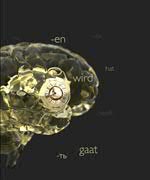New information could change therapies for aphasia patients
Therapies for people with aphasia can now be approached from an entirely new angle. This is the conclusion from research carried out by Laura Bos and Rimke Groenewold, who will both be awarded a PhD for a project relating to aphasia on 22 January. Bos and Groenewold will be awarded PhDs by the University of Groningen, but will also receive doctorates from the University of Potsdam and Macquarie University (Sydney). This will be the first time that the University of Groningen has awarded joint PhDs of this kind.
People with aphasia (a language disorder caused by acquired brain injury) have difficulty with certain aspects of language, such as processing grammatically complex sentences and accessing their vocabulary. In the Netherlands, some 30,000 people suffer from aphasia. Roelien Bastiaanse, who supervised Bos and Groenewold, is Professor of Neurolinguistics specializing in aphasia. She stresses the importance of these two PhD projects. ‘Groenewold and Bos have both made serious advances in our understanding of how language is stored in the brain. This is vitally important; after all, we can only devise effective therapy if we know how language works inside our heads.’
More direct speech
The research conducted by Rimke Groenewold focused on the way people process direct speech constructions. For example, ‘John said: “I have to go”’ rather than ‘John said that he had to go’. ‘People with aphasia tend to use this construction more often than people who don’t have aphasia. It’s probably a strategy for avoiding problems with grammar and vocabulary,’ says Groenewold. She also studied the effect on the listener. ‘It is often said that direct speech livens up our communication. My research verifies this, and shows that it also applies to the speech of people with aphasia. On the other hand, it didn’t appear to affect the comprehensibility of what was being said.’ Finally, Groenewold’s research showed people understand direct speech better than indirect speech, whether they have aphasia or not. Groenewold would therefore like to see more use of direct speech in communication with aphasia patients.

Difficulty with time reference
Laura Bos focused her research on verbs referring to the past. People with aphasia tend to find verbs, which are one of the most vital aspects of human communication, difficult. Verbs referring to the past (such as ‘he walked’) appear to pose a greater problem than verbs referring to the present or future. Bos concentrated on testing the Past Discourse Linking Hypothesis, devised by Bastiaanse and colleagues. This hypothesis states that verbs referring to the past are more difficult than verbs referring to the present, because they relate to an activity before the moment of speaking. Bos thinks that her research will help in the interpretation of aphasia tests and with the development of new therapy materials. ‘Comprehensible, informative language is an essential aspect of communication. The focus of aphasia therapy is currently on verbs. To my mind, learning a more varied range of verbs that convey the right meaning should be more important than learning to conjugate them correctly.’
Doctorate at three universities
Bos and Groenewold will each be awarded a PhD as part of the IDEALAB programme, which is funded by the European Union. They will receive joint PhD certificates, which means that candidates are awarded a doctorate by not one, but two or more universities – in this case the University of Groningen, the University of Potsdam and Macquarie University . Teaching and research for the PhD is provided in a joint track devised by the universities concerned. This will be the first time that the University of Groningen has awarded a degree certificate of this kind.
More information
Rimke Groenewold
, r.groenwold[at]rug.nl
Laura Bos, l.s.bos[at]rug.nl
Roelien Bastiaanse, y.r.m.bastiaanse[at]rug.nl
More news
-
19 January 2026
Digitization can leave disadvantaged citizens in the lurch
-
13 January 2026
Doing good in complex situations
